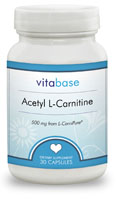| |
Sources of carnitine |
|
| Dietary sources of carnitine include foods of animal origin, such as meat and dairy products. Red meat (particularly lamb) and dairy products are the primary sources of carnitine. Carnitine can also be found in fish, poultry, tempeh (fermented soybeans), wheat, asparagus, avocados, and peanut butter. Cereals, fruits, and vegetables contain little or no carnitine. Carnitine can be manufactured in the body provided the requisite vitamins and minerals are also present. A typical Western diet supplies about 100mg of carnitine per day. It is found mostly in red meats and dairy products. Plant foods are not good sources of carnitine. In general, healthy adults do not require dietary carnitine as carnitine stores are replenished through endogenous synthesis from lysine and methionine in the liver and kidneys. |
|
|
|
|
